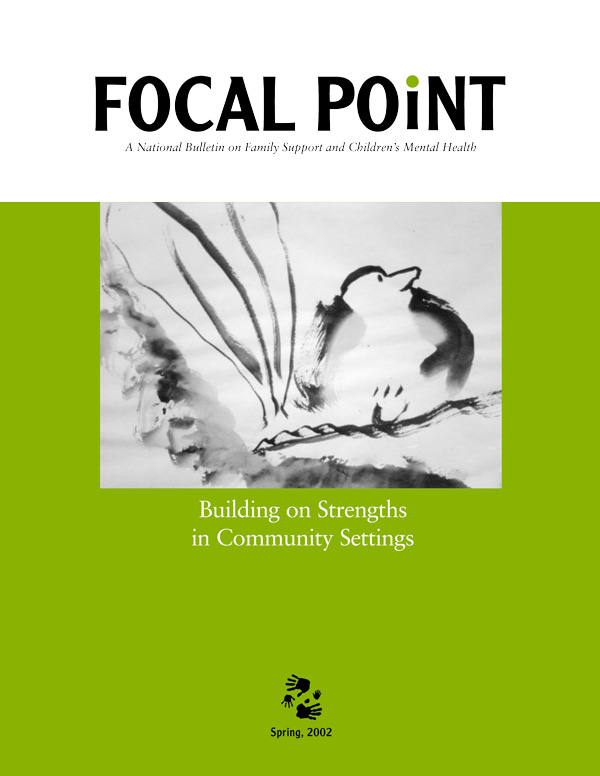Focal Point Spring 2002

"Building on Strengths in Community Settings" (2002), v.16(1)
This issue of Focal Point is an effort to help allay some doubts and stimulate some creativity around the issue of providing opportunities for children and youth with emotional and behavioral disorders to participate in asset-enhancing, community-based, and community-building activities. This issue features research on successful programs and strategies which are onsistent with this ideal: efforts which appear to be successful at helping young people to develop supportive relationships in the community, to engage in activities that challenge and extend their capabilities, and to find larger life goals and meaning.
Access Articles in this Issue
-
Introduction: Building on Strengths in Community Settings: Asset–Enhancing Strategies for Children and Families
Walker, J. S.
In providing services to children with emotional and behavioral challenges, there is mounting evidence that asset–enhancing strategies are more effective than skeptics believe. What is more, there is also evidence that traditional mental health services—particularly psychotherapy—may well be less effective than previously assumed. As a result, well–designed, community–based, asset–enhancing options need no longer seem risky or of secondary importance in comparison to traditional services.
-
Friends of the Children: A Successful Mentoring Program for At–Risk Children
Berman, S.
Friends of the Children is an innovative long–term mentoring program in Portland, OR, that matches at–risk children with professional mentors. These mentors, called Friends, work with no more than eight children, and expect to continue working with these same children until they graduate from high school. The article describes the program and provides information on costs, outcomes and evaluation. Included are first–person stories from a Friend, a mentee, and a clinician from the program.
-
Empowering Kids to Dance to the Drummer Within: Youth Advancement Through Music and Art (YATMA)
Rossi, M.
Youth Advancement Through Music and Art (YATMA) is a Seattle–based program providing long–term creative mentoring in music and the arts. The YATMA approach is strengths based and relational, and enables YATMA teachers to reach youth who are typically difficult to engage. The article describes the YATMA approach to mentoring, and provides vignettes from young people involved in the program.
-
The Practice, Quality, and Cost of Mentoring
Grossman, J.B.
This article provides an overview of recent research on: the essential elements of successful mentoring programs, measures that can be used to assess the effectiveness of a program; the costs of mentoring programs; and the challenges that mentoring programs face.
-
What an Honor: One Youth in Transition
Rumbaugh, M.
The author describes her work as the facilitator of a Wraparound team for a young woman returning to the community after an acute hospital stay. The article focuses on the team's efforts to facilitate a transition from a reliance on formal supports to more informal or natural supports.
-
Friendship is to People What Sunshine is to Flowers: Building Social Networks of People with Mental Illness
Griffiths, T.
This article describes the work of Compeer, an organization dedicated to increasing resilience among people with mental illness by building their social support networks. Specifically, compeer matches youth or adults with mental illness to adult volunteers. The article provides a program description as well as evaluation information, and describes the successes the program has achieved as well as some of the challenges it faces.
-
Facilitating Friendships for Children with Disabilities
Cook, J.
Over the last decade, increased attention has been focused on the importance of friends for children with disabilities. This article describes strategies that have been used successfully by concerned parents, teachers, and community members to promote peer friendships between children with and without disabilities.
-
Healing Through Action: Therapeutic Drama
Kidder, B.
The author, a drama therapist, describes her work helping young people realize their strengths through creating and performing drama. The article describes her troupe's work, performing and conducting workshops with young people in prisons and treatment centers.
-
Service Opportunities for Youth with Emotional and Behavioral Challenges: Community Service: Rationale, Outcomes, and Best Practices
Caplan, E. H. & Schutte, K.
This article reviews the current state of knowledge about the qualities of programs that provide community service opportunities for children and youth with emotional and behavioral challenges.
-
Writing from the Heart: Workshops for Children with Emotional and Behavioral Difficulties
Berry, J.
The author describes her work teaching creative writing with youth with emotional and behavioral difficulties. The article includes poetry by several of the young people who participated in the class.
-
Spirituality and Mental Health: A Native American Perspective
Cross, T.
Among Indian people, there is an almost universal belief in the importance of spirituality and the influence of spiritual forces in the balance of one's life. The author discusses the role of this belief in the achievement and maintenance of mental health.
-
Identifying Community Supports: Some Informal Anecdotes
Grealish, M.
The author describes strategies she has used to identify informal and community support people—mentors, sponsors, parent coaches, friends—to participate on Wraparound teams.
-
The Dance of Life: Incorporating Disabled Children into the Life of the Spiritual Community
King, S.
The author, a pastor in Columbus, Ohio, reflects on what it takes to truly welcome disabled children into her congregation and the spiritual community.
-
Who am I? Why Family Really Matters
Boisvert, B., Brimner, G., Campbell, K., Koenig, D., Rose, J. & Stone–Smith, M.
Among Indian people, there is an almost universal belief in the importance of spirituality and the influence of spiritual forces in the balance of one's life. The author discusses the role of this belief in the achievement and maintenance of mental health.